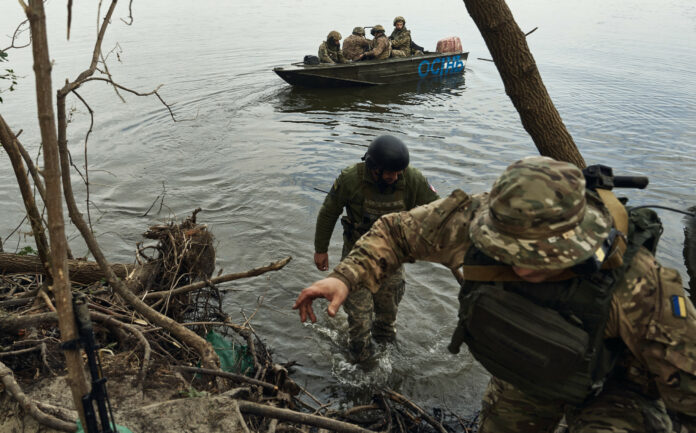A Russian flotilla just announced by Moscow will be vulnerable to Ukrainian drones which have wreaked havoc on Russia’s Black Sea Fleet, British defense officials have said.
Last week, Russian Defense Minister Sergei Shoigu revealed the formation of the Dnieper (Dnipro) River Flotilla and a boat brigade, which will likely help secure waterways and islands that separate Russian and Ukrainian-controlled parts of the Kherson region.
The flotilla is a reprise of river units active during the Russo-Turkish wars in 1735-1739 and 1787-1792, the Russian Civil War, World War II, and the Cold War.
The latest version of the flotilla is likely to operate under Russia’s Dnieper Group of Forces, and Shoigu said it would include an army corps, a motorized rifle division, and a boat brigade, although the strength and level of equipment of these units are unclear.
Getty Images
In its update on Wednesday, the U.K. Ministry of Defense said that Russia wants to prevent Ukrainian forces from undertaking cross-river operations like the one which has established the bridgehead at Krynky, where both sides have lost large numbers of troops and equipment.
The flotilla is likely to “decouple river patrolling functions from the Black Sea Fleet” the British defense officials said.
However, Russia’s new flotilla could face the same fate as the vessels of Russia’s prestigious fleet which has been forced further east to Novorossiysk due to Ukrainian drone strikes which have targeted vessels and infrastructure in and around Sevastopol.
“The Dnipro (Dnieper) Flotilla will likely be vulnerable to Ukrainian uncrewed surface vehicles which have been effective in destroying Russian vessels operating in the Black Sea,” said the update, which tends to emphasize Ukrainian gains and Russian losses.
During his announcement on March 20, Shoigu also outlined plans to form two new armies, including 14 divisions and 16 brigades.
Former British defense attaché to Moscow, John Foreman, told Newsweek last week that Shoigu’s announcements were simply a reiteration of previously revealed plans to enlarge the Russian army in response to Finland and Sweden joining NATO and did not signal an imminent attack on the alliance.
The plans included the re-formation of the Moscow and Leningrad military districts, plans announced to increase the overall size of the Russian Armed Forces from 1.2 million to 1.5 million and also proposals to boost the army.
“There have been few announcements to increase the Navy and Air Force, showing the preoccupation with the land environment from Russia’s perspective,” Foreman said.
Uncommon Knowledge
Newsweek is committed to challenging conventional wisdom and finding connections in the search for common ground.
Newsweek is committed to challenging conventional wisdom and finding connections in the search for common ground.


